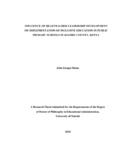| dc.description.abstract | Effective headteacher leadership is critical to the successful implementation of
inclusive education (Waldron, McLeskey & Redd, 2011). The mandate to achieve
inclusive schooling implies that headteachers are expected to ensure their schools
are both excellent and equitable. This is particularly imperative considering that
the overarching principle of inclusive education is that every child counts
(Bernard, 2000). Besides, most research on inclusive education in Kenya appears
to consistently support effective implementation and sustainability of inclusive
schooling (Buhere & Ochieng, 2013; Njoka et al., 2012). Nonetheless, a research
gap exists in relation to the leadership development of headteachers in order to
transform schools into effective inclusive learning environments. Thus, this
research was designed to investigate the influence of headteacher leadership
development on the implementation of inclusive education. The research was
guided by five questions, which investigated the existing types of leadership
development programmes for headteachers, the adequacy of the programmes’
contents, and the effectiveness of their design features in relation to inclusive
education implementation. The study also examined the effectiveness of the
leadership development programmes in facilitating inclusive education. Finally,
the policy and institutional challenges experienced in the implementation process
were investigated. The research was conducted in public primary schools in
Kiambu County. The target population was 475 headteachers, 7472 class teachers,
and 30 Quality Assurance and Standards Officers drawn from the 10 districts and
Thika municipality in Kiambu County. Also targeted were 10 KEMI trainers. The
final sample constituted 125 headteachers and 240 class teachers randomly
selected from 5 districts and Thika municipality. It also included 12 Quality
Assurance and Standards Officers and 8 KEMI trainers, who were purposefully
sampled. The research utilized a mixed methods approach. The convergent
parallel design was adopted, since it provides for collection and analysis of both
quantitative and qualitative data in the same phase of study (Creswell & Clark,
2011). Quantitative data was analysed using descriptive statistics and presented in
frequency tables, pie charts and bar graphs. Qualitative data was coded according
to content, analysed based on emerging themes, and presented in narrative form.
The study established that the most common forms of leadership development
were short courses such as, conferences, workshops, and seminars. The KEMI
modular-based programme was ranked first, with 78% of headteachers in the
study deeming the leadership programme the most helpful in facilitating inclusive
education. The innovative practices of the KEMI programme included the use of
the cohort model, problem-based learning, case studies, and projects. However,
specific gaps such as, limited inclusive education focus, non-alignment to
leadership standards, lack of mentoring and coaching, and insufficient focus on
career stages were identified. Overall, the study established that the existing
headteacher leadership development programmes were not based on particular
leadership standards or inclusive education philosophy, vision and mission. Also,
the programmes were neither ongoing nor career-staged. They seemed to apply
the concept of “one-size fits all” and did not utilize job-embedded learning
practices, such as mentoring and coaching. Instructively, only six percent of the
headteachers deemed the existing leadership programmes to be effective. The
majority of headteachers (94%) rated the programmes as either somewhat
effective (30%) or not effective (64%) respectively. Likewise, 88% of
headteachers did not perceive themselves competent to lead inclusive education
implementation. The main conclusion of the study was that the headteacher
leadership development programmes were not comprehensive and well-integrated
to effectively facilitate implementation of inclusive education. Therefore, the
study recommends a coordinated and multi-pronged action plan to spur requisite
policy reforms, system alignments, and funding strategies in order reframe
headteacher leadership development. Specifically, the Teachers’ Service
Commission and Ministry of Education, Science and Technology should
collaboratively develop leadership standards for headteachers in order to spur
improvements in leadership programmes’ quality and effectiveness. The County
Education Board should develop inclusive education indicators to be utilized
when designing and implementing school development plans. Moreover, in order
to model effective inclusive programmes and practices at least five model
inclusive schools should be established in each district through a well-resourced
programme implemented by respective District Education Board. | en_US |

